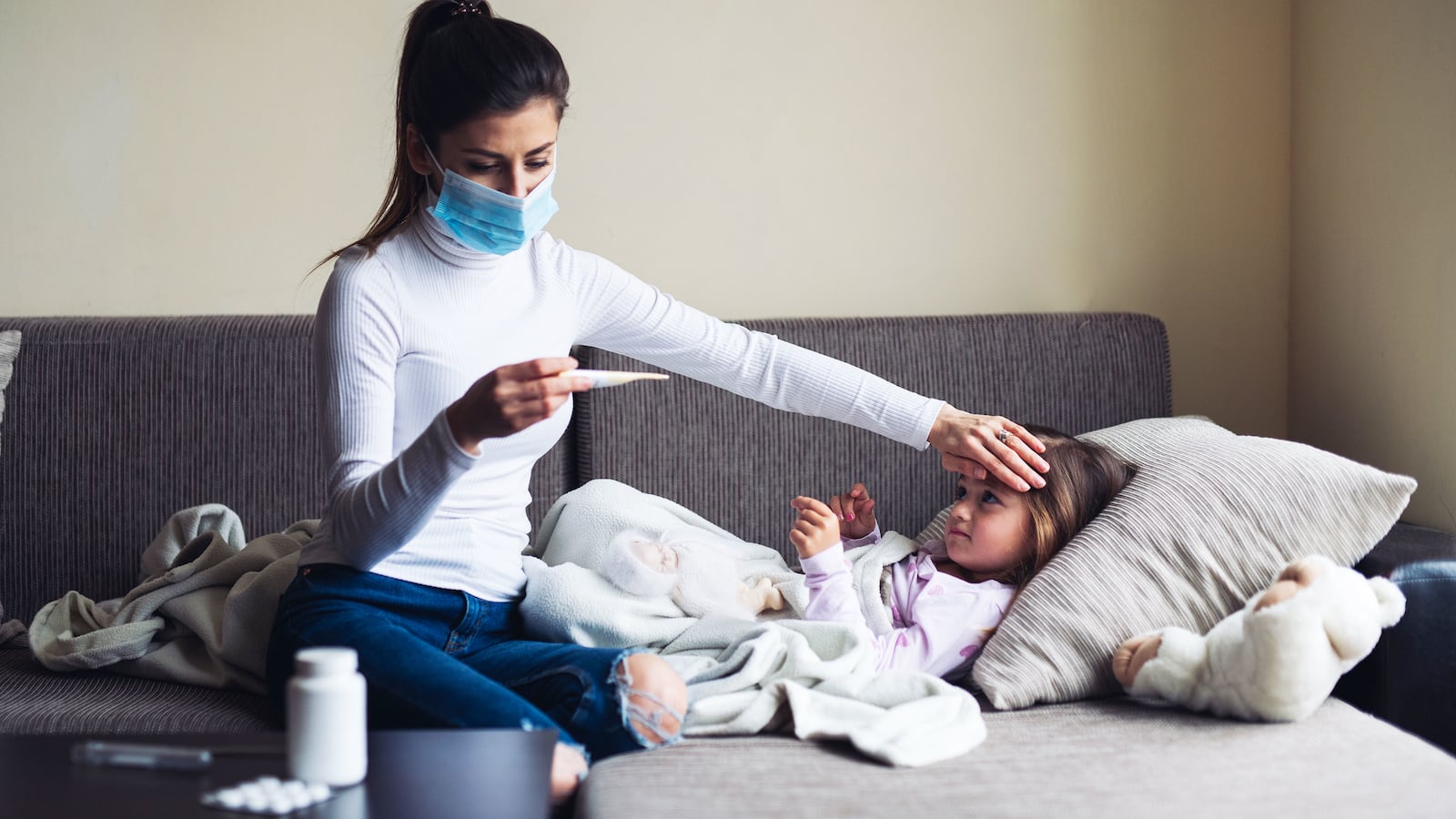Three weeks ago, Emily Stone rushed her 2-year-old daughter, Rebel, to the emergency room at Nicklaus Children’s Hospital in Miami.
The curly blond toddler had spiked a fever of 101 degrees and was lethargic, her mother told The Daily Beast. “While we were waiting to be seen, her fever broke and that was it,” Stone said. “We had them test her anyway for COVID-19. Because her symptoms were so minor, the nurse told me that she highly doubted Rebel was positive.”
Rebel didn’t have to be admitted and Stone took her home. A few days later, her husband started feeling ill around the same time she got the call about Rebel’s test results. “He had a runny nose, chest congestion, and achy muscles,” Stone said. “Her test also came back positive. So I had a testing service come out and test all of us, including our housekeeper and our babysitter.”
Within 48 hours, Stone—who was able to bypass a notoriously dysfunctional testing apparatus in Florida and elsewhere—got the results. She and her other daughter, 5-year-old Harper, tested negative, as did the hired help. But her husband was positive. Since the pandemic shut down schools and businesses in March, the only contact her children had with the outside world was attending swim school after Miami-Dade eased its lockdown and allowed summer camps to resume, Stone said.
“The people at the swim school were so careful,” Stone said. “They lowered the number of kids, the instructors wore face shields, and no parents were allowed out of their cars when picking up their children. I get groceries delivered via Instacart and I only go out if I need kosher meat. My husband hasn’t left the house either.”
But the Stone family’s brush with COVID-19 was just one of a growing number of pediatric cases that—when coupled with state data indicating coronavirus-related hospitalizations among children are on a rapid ascent—suggest Florida Gov. Ron DeSantis’ campaign to reopen schools in one of the nation’s pandemic epicenters could backfire spectacularly.
A DeSantis spokesperson did not respond to email requests for comment for this story. On Tuesday, Florida reported 9,240 new COVID-19 cases, after routinely surpassing 10,000 cases a day earlier this month. The state also logged a record 186 deaths, bringing the total to at least 6,117.
“Every parent needs to weigh on their own if it is feasible to send their kids back to school,” Stone said. “I’ve opted to pull my oldest daughter from public school because I don’t have enough confidence in what public schools would do to minimize exposure.”
Still, last week, DeSantis urged parents like Stone to cast aside their coronavirus-induced anxiety during a televised address. The governor argued children have less of a risk of getting sick than adults—which studies and experts have generally agreed is the case. “The choice before us is whether we face our challenges with determination and resolve, guided by evidence, or whether we allow ourselves to become paralyzed by fear,” DeSantis said. “Fear doesn’t help us combat the virus.”
But there’s growing evidence COVID-19 can affect children just as severely as adults—even if the rate of infection is significantly lower among kids. Over the weekend, 9-year-old Kimora “Kimmie” Lynum became the youngest person to die in connection with COVID-19 in Florida. Relatives told local news outlets that Lynum was a healthy child with no pre-existing conditions. She died in her sleep after being sent home from a local hospital where her mother had taken her because the little girl had a high fever.
Another child, 8-year-old Zane Wambler, has spent more than a week in the intensive-care unit at the same hospital where Stone took Rebel. Wambler was being treated for multi-symptom inflammatory syndrome, or MIS-C, the disturbing illness associated with coronavirus that appears to only affect children and surged in hot zone New York this spring. According to Local 10 News, Wambler became violently ill and had a fever of 105.1 degrees when he arrived at a hospital close to the family home in Tavernier, one of the islands that make up the Florida Keys. The young boy did not show any improvement, so his family brought him to Nicklaus Children’s Hospital, where he was placed in intensive care.
As his mother, Leah Wambler explained to The Daily Beast in a text message, “We have a lot going on right now with Zane.”
Florida health department statistics indicate the number of children needing medical attention for coronavirus was on the rise, as CNN reported. On July 24, the state reported 303 child COVID-19 hospitalizations, a 23 percent increase in eight days. During the same period, kids testing positive for coronavirus jumped by 34 percent.
Aileen Marty, a Florida International University infectious-disease professor, told The Daily Beast that children of all ages are susceptible to COVID-19, but only a small number develop severe disease symptoms that require hospitalization. Still, kids can serve as vectors of transmission—even if there’s some evidence younger children may be less likely to do so. “Children have viral loads equal to those of other age groups,” Marty said. “Thus, they can be the index case for a cluster of cases just as adults can be index cases. Children have been infected by other children and children have been infected by adults.”
Marty, who is advising the Miami-Dade County government and Miami-Dade Public Schools, said some children who do get sick can develop shortness of breath with blue lips and other signs of hypoxia that require hospitalizations. “Children can quickly progress to acute respiratory distress syndrome or respiratory failure, and may also have shock, encephalopathy, myocardial injury or heart failure, coagulation dysfunction, and acute kidney injury,” she said. “Organ dysfunction in children can be deadly.”
Among symptomatic children admitted into hospitals for COVID-19, about 29 percent require supplemental oxygen and 12 percent require mechanical ventilation, Marty added. She said Miami-Dade’s public schools are not in a position to reopen as of today based on several criteria that have not been met. That includes the county having a sustained test positivity rate of less than 10 percent, a sustained decrease in ICU bed capacity, and a steady reduction in the number of individuals hospitalized.
To be sure, pediatric ICU bed capacity in Florida and Miami-Dade is at 59 percent, which is faring better than adult ICU bed capacity, Marty noted. “Hospitals regularly run at over 90 percent capacity,” she said.
Keith Meyer, a pediatrician and medical director at Nicklaus Children’s Hospital, said a majority of the children in the ICU unit there were recovering well. “They are in and out of the hospital within a few days,” he said.
Nevertheless, there is still so much uncertainty surrounding COVID-19 that it will take time before local schools could reopen without serious problems arising, Meyer argued.
“The virus is not a joke,” Meyers said. “Most children who get COVID-19 and MIS-C do very well. The real risk is that they can bring it to the adults at home. You could have more spread.”



